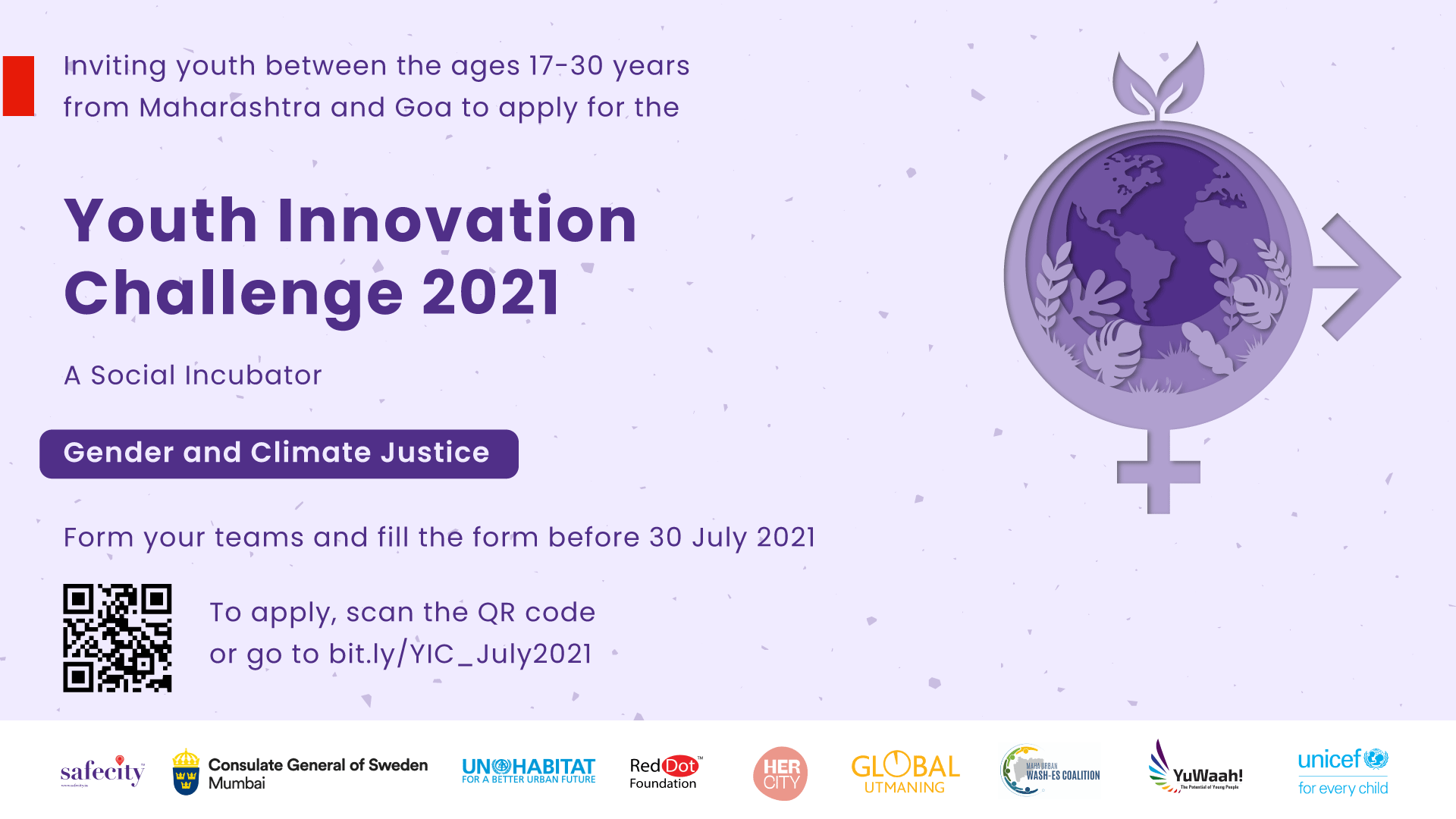Attend an Event

- This event has passed.
Youth Innovation Challenge 2021
July 1, 2021 @ 12:00 am - July 30, 2021 @ 11:30 pm

This innovation challenge is jointly hosted by The Joint Commissioner, Directorate of Municipal Administration, Government of Maharashtra, UN Habitat, UNICEF, The Consulate General of Sweden in Mumbai, Global Utmaning and Red Dot Foundation.
Theme – Women Empowerment for Climate Mitigation, Adaptation and Resilience
Focus – Gender and its intersection with Climate Mitigation, Adaptation and Resilience
SDGs – 5 Gender Equality, 6 Clean Water and Sanitation for All, 8 Decent Work and Economic Growth, 10 Reduced Inequalities, 11 Sustainable Cities and Communities, 13 Climate Action, 17 Partnerships for the Goals
The call for the Youth Innovation Design Challenge will commence on July 1 2021.
The team must have minimum of 2 people, at least one of them must be a young girl/woman.
Teams should not exceed four members.
Age group – 17 – 30 years.
Must be willing to participate in all activities of the competition. The sessions will be virtual due to the pandemic.
Teams must be based in Maharashtra and Goa and test their prototypes locally.
We are looking for solutions that can empower women (creation of jobs or be managed by them) to address climate adaptation and/or resilience.
Background and Key terms:
Climate justice addresses climate change from an intersectional perspective and through a knowledge system, acknowledging that climate change only exacerbates the gender gap. Climate justice, therefore, demands action and seeks solutions that also transform gender relations.
The World Economic Forum in its Global Gender Gap Report 2020 placed India at an overall rank 112 out of 153 nations. India was ranked 123rd in the 2019 Gender Inequality Index (published in 2020). The report noted that the labour force participation rate of women in the country was 20.5 per cent, while it was 76.1 per cent for men. These existing indices are controversial as they still do not capture important dimensions of gender equality and women’s socioeconomic wellbeing and do not take the regional context and insuperable conditions of developing countries into account.
By 2018, the world’s average surface temperature was approximately 1°C above pre-industrial levels. According to the most recent IPCC report, which that focused on oceans and the cryosphere, during the 20th century, the global mean sea level rose by 15 cm and is expected to reach up to 30-60 cm by 2100 even if greenhouse gas emissions are sharply curtailed and global warming is limited to well below 2º Celsius. Further, the ocean has absorbed to 90% of the excess heat of the climate system and has warmed by 0.8º already.
The impact of these changes is already evident in the global south, especially in poor economies where a large proportion of people depend on environmental resources for their daily sustenance. The sea-level rise, for example, has rendered coastal groundwater saline in many locations, making them unsuited to agriculture.
The world’s fish production from the sea has also dropped in the last few decades, impacting millions of fisher-people. The gender and climate data together suggest our prevailing climate crisis is unprecedented. The connection between the two is that the climate crisis is primarily fuelled by a masculine hunger for growth and profits based on a model that appropriates environmental resources. These resources are the base for millions of poor and marginalised women and men living below poverty line. Male-driven economies have created externalities in the form of a rapidly changing climate that is now hovering near a tipping point. The masculinity of economics is in turn guided by the masculinity of politics.
Therefore we are inviting youth to ideate, design and develop solutions that can be deployed by women in the following areas.
*Mitigation – Gender responsive, Covid sensitive, low carbon development in urban design, buildings and transport
*Adaptation – Gender sensitivity in adaptation efforts
*Technology – Covid sensitive, types of low carbon technology technologies needed and acceptable from a woman and gender perspective.
*Emergency Response – Access to safe water and sanitation during emergencies
Some examples where innovations could benefit are –
*Livelihood- Women are often responsible for gathering and producing food, collecting water etc. With climate change, these tasks are becoming more difficult.
*Health & environment – Women are primary caregivers in any household.
*Climate change increases spread of diseases; reduces drinking water availability and it’s potability; creates food insecurity ; and increased cases of heat stress and respiratory illness.
*WASH in emergencies and Covid Setting –Women and adolescent girls often face issues with access to safe sanitation ( access to hand washing, climate resilient toilets), potable drinking water and access to absorbents for menstrual hygiene management. Gender and Covid Sensitive sensitive water, sanitation and hygiene services and practices need to
Key Dates:
July 1 – Announcement of the Youth Innovation Design Challenge and open for registration
July 30 – Registrations close
Aug 1 – 10 Teams are selected by a jury team. Teams proceed through the incubation lab
Aug 12 – Launch of the program on International Day of Youth
Mid Aug to End Sep – Mentoring and capacity building sessions to develop ideas
Oct 22 – Final pitches during Urban October. Final winners announced after jury selection
Capacity building sessions include but are not limited to:
Understanding the New Urban Agenda and Sustainable Development Goals
Her City Toolkit for action planning and stakeholder engagement
Developing a Business Model Canvas
Creating a Business Plan
Art of Storytelling and Pitching
One on one Mentoring
Benefits for young people to participate:
Opportunity to design and develop a solution that can contribute to change.
Mentoring by experts.
Capacity building sessions to help them develop their social entrepreneurial skills.
Opportunity to win cash prizes.
Certificate by the organisers and the top 10 solutions in the challenge will be featured as part of the UTC report to UN Habitat’s World Urban Campaign.
